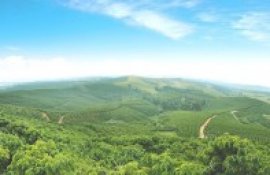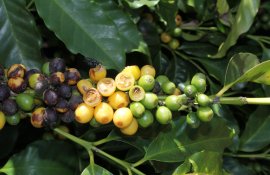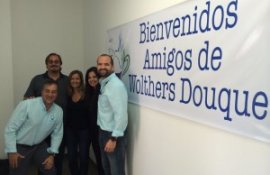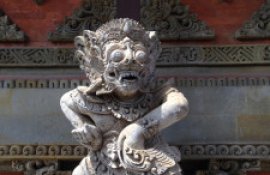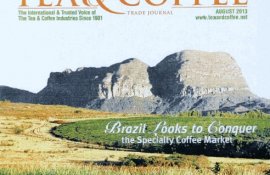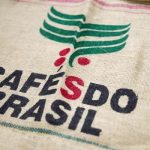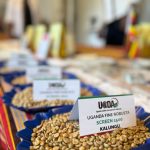Mid Year Report Focused on Brazil
 Once again, it’s past mid July and another cold front from the South Pole is over the Brazilian coffee belt.
Once again, it’s past mid July and another cold front from the South Pole is over the Brazilian coffee belt.
If frost that threats to hit the coffee trees confirms, we have a problem for the next years to come. If not, we should be back to the supply comfort zone most players believe are able to manage. Not so, according to what I have seen happen in the Brazilian coffee fields this year!
A frost in any location of the Brazilian coffee belt will always have a noticeable impact, maybe lesser and shorter lived than historically, nevertheless, some consequences are unavoidable.
On the other hand, the impact of an extended continental drought or excessive rains during the harvest season have become a bigger and more dramatic threat to the organic behavior of green Arabica coffee supply and prices.
This year, during May, June and July, Brazil has experienced an uncommon meteorological event; one coffee producer prays not to experience, “excessive rains “in the wide Brazilian Coffee belt.
 Fasten your seat belts, it will be another turbulent ride and certainly, another rich learning experience for the green and roasted coffee trade Industry. Our minds and operations are still flooded with the consequences, pain or gains related to the actual Mild and Other Mild coffee squeeze. On the other hand, the future regarding these coffees may be showing signs of improvement towards normalization.
Fasten your seat belts, it will be another turbulent ride and certainly, another rich learning experience for the green and roasted coffee trade Industry. Our minds and operations are still flooded with the consequences, pain or gains related to the actual Mild and Other Mild coffee squeeze. On the other hand, the future regarding these coffees may be showing signs of improvement towards normalization.
Many coffee roasters and food companies have revisited their strategy on supply practices; some have taken decisions towards changing their blend composition or creating new blends with different origins.
Brazilian Full Washed and Pulped Natural coffees seem to be in the center of these decisions and changes. The green coffee internal market in Brazil is experiencing a golden moment for the Pulped Naturals and Full washed coffees, some companies and a few export – able Coops, are paying up in price for every new lot available.
Knowing the Brazilian coffee scenario a little more than I know the other origins, I cannot see the benefit of such rush by big players on limited inventories, the search for an alternative origin as a substitute for Milds and Other Milds seems very limited considering Brazil coffees.
Considering the numbers, Brazil will only produce a combined 2.6 million bags of Full Washed and Pulped Naturals this year, another 25% of this volume is shed-off by export grading and screen sizing. Only 2 million bags of Washed and Pulped Natural will be exportable, this is less than 9 % of all washed Mild and other Mild Latin American coffees. Another important point is that Brazilian Arabica coffees grow at altitudes raging from sea level to 3.600 feet, 70% is cultivated between 2.500 and 2.900 feet, therefore, non are high grown.
Considering the level of demand and commitments for these special preparations from Brazil, I can’t stop thinking of what is happening with Colombian and Central American coffees, it feels like “Deja Vu “, but this time, with Brazilian Washed and Pulped Naturals.When considering the Natural Brazilian Arabica coffees for the 2009/10 cycle, the challenge to reach quality will be HUMONGUS/enormous. The rains over the coffee belt persist, as a matter of fact, this past weekend was not different, rains extended more damage to yet new lots of coffees in patios and in fields.
By now, probably 30% of the entire Arabica production in Brazil has suffered some level of rain damage. The harvest season has reached mid point and mostly natural preparation is still to be harvested, hopefully the rains will cease and quality will have a chance again.
As the harvest goes on, we will keep you informed about the developments.
Let’s look at coffee preparations and volumes out of Brazil this year:
Naturals – 92% (abt 29.5. million bags Arabica from an expected 32 million bag 2009/10 crop Arabica crop + 11 million Robusta ), these coffees are picked by hand or machine, as coffees are harvested in green, cherry red or raisin and dry state, they are laid to dry under the sun on drying patios, later, artificial dryers finish the process before hulling and bagging the green beans for export.
Full washed – 3% (abt 1 million bags) of the entire Brazilian Arabica production, only red or yellow full mature fruits are selected at harvest and pulped. Wet mucilage – rich pergaminio beans are then laid to ferment in humid or wet water tanks for fermentation and mucilage removal, thereafter, spread to dry on sun patios and finished through artificial mechanic dryers before pergaminio hulling and bagging for export.
Semi Washed – This process does not exist, it’s mostly a marketing nomination tool to upgrade by impression, the Pulped Natural preparation. Try to Semi Wash your children after playing in the yard, Semi Wash your clothes or your hair??
Pulped Natural – Yessss, this is the correct description, 5% (1.6 million bags) of the entire Arabica production, these coffees are harvested selectively or in bulk with all levels of maturation fruits. The Pulped Naturals are a result of only full mature fruits which after pulped, flow onto drying patios, later, the same beans will be finished by artificial dryers. The dry Pergaminio bean will then be hulled and bagged for export after graded and screen selected.
 At the Ipanema farms, our structure and skills are able to deal with most weather scenarios and this year. We have already secured the quality of our coffees. On the other hand, additional demand will find resistance from our part as we cannot risk to sell any volume above our commitments.
At the Ipanema farms, our structure and skills are able to deal with most weather scenarios and this year. We have already secured the quality of our coffees. On the other hand, additional demand will find resistance from our part as we cannot risk to sell any volume above our commitments.
From Guatemala, Wolthers, Vittrup & Associates inform that the trade is very thin, shippers are mostly waiting on Colombia’s next moves regarding prices and available new crop volume.
Prices for new crop have been on the conservative side,very little volume is offered, Hard Bean was quoted this week at + 24 and SHB’s at + 30 FOB.
Wolthers, Vittrup & Associates Bogota’ informs that more coffees are being offered and FOB prices are + 68 for UGQ’s and + 70 for Supremos.
Gabriel Silva, head of the FNC has been assigned to lead the Defense Ministery, his substitute at the FNC has not been confirmed yet.
Take a look at the outstanding Nucoffee lots we have available in the West Coast, these are SCAA 84 point + coffees, ideal for Espresso blends or even as single origin.
The best of the current crop coffees is slowly leaving the buiding, take advantage and secure your needs while only a few coffees are still available.
Best regards,
Christian Wolthers
Wolthers America/Wolthers & Associates
Category: Archives





